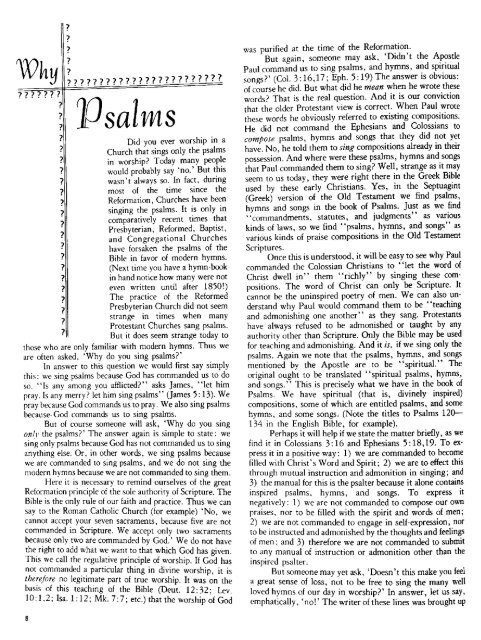Covenanter Witness Vol. 86 - Rparchives.org
Covenanter Witness Vol. 86 - Rparchives.org
Covenanter Witness Vol. 86 - Rparchives.org
You also want an ePaper? Increase the reach of your titles
YUMPU automatically turns print PDFs into web optimized ePapers that Google loves.
Why7777 77 777????????????? 111111111Psal saimsDid you ever worship in aChurch that sings only the psalmsin worship? Today many peoplewould probably say 'no.' But thiswasn't always so. In fact, duringmost of the time since theReformation, Churches have beensinging the psalms. It is only incomparatively recent times thatPresbyterian, Reformed, Baptist,and Congregational Churcheshave forsaken the psalms of theBible in favor of modern hymns.(Next time you have a hymn-bookin hand notice how many were noteven written until after 1850!)The practice of the ReformedPresbyterian Church did not seemstrange in times when manyProtestant Churches sang psalms.But it does seem strange today tothose who are only familiar with modern hymns. Thus weare often asked, 'Why do you sing psalms?'In answer to this question we would first say simplythis: we sing psalms because God has commanded us to doso. "Is any among you afflicted?" asks James, "let himpray. Is any merry? let him sing psalms" (James 5:13). Wepray because God commands us to pray. We also sing psalmsbecause-God commands us to sing psalms.But of course someone will ask, 'Why do you singonly the psalms?' The answer again is simple to state: wesing only psalms because God has not commanded us to singanything else. Or, in other words, we sing psalms becausewe are commanded to sing psalms, and we do not sing themodern hymns because we are not commanded to sing them.Here it is necessary to remind ourselves of the greatReformation principle of the sole authority of Scripture. TheBible is the only rule of our faith and practice. Thus we cansay to the Roman Catholic Church (for example) 'No, wecannot accept your seven sacraments, because five are notcommanded in Scripture. We accept only two sacramentsbecause only two are commanded by God.' We do not havethe right to add what we want to that which God has given.This we call the regulative principle of worship. If God hasnot commanded a particular thing in divine worship, it istherefore no legitimate part of true worship. It was on thebasis of this teaching of the Bible (Deut. 12:32; Lev.10:1.2; Isa. 1:12; Mk. 7:7; etc.) that the worship of God8was purified at the time of the Reformation.But again, someone may ask, 'Didn't the ApostlePaul command us to sing psalms, and hymns, and spiritualsongs?' (Col. 3:16,17; Eph. 5:19) The answer is obvious:of course he did. But what did he mean when he wrote thesewords? That is the real question. And it is our convictionthat the older Protestant view is correct. When Paul wrotethese words he obviously referred to existing compositions.He did not command the Ephesians and Colossians tocompose psalms, hymns and songs that they did not yethave. No, he told them to sing compositions already in theirpossession. And where were these psalms, hymns and songsthat Paul commanded them to sing? Well, strange as it mayseem to us today, they were right there in the Greek Bibleused by these early Christians. Yes, in the Septuagint(Greek) version of the Old Testament we find psalms,hymns and songs in the book of Psalms. Just as we find"commandments, statutes, and judgments" as variouskinds of laws, so we find "psalms, hymns, and songs" asvarious kinds of praise compositions in the Old TestamentScriptures.Once this is understood, it will be easy to see why Paulcommanded the Colossian Christians to "let the word ofChrist dwell in" them "richly" by singing these compositions.The word of Christ can only be Scripture. Itcannot be the uninspired poetry of men. We can also understandwhy Paul would command them to be "teachingand admonishing one another" as they sang. Protestantshave always refused to be admonished or taught by anyauthority other than Scripture. Only the Bible may be usedfor teaching and admonishing. And it is, if we sing only thepsalms. Again we note that the psalms, hymns, and songsmentioned by the Apostle are to be "spiritual." Theoriginal ought to be translated "spiritual psalms, hymns,and songs." This is precisely what we have in the book ofPsalms. We have spiritual (that is, divinely inspired)compositions, some of which are entitled psalms, and somehymns, and some songs. (Note the titles to Psalms 120—134 in the English Bible, for example).Perhaps it will help if we state the matter briefly, as wefind it in Colossians 3:16 and Ephesians 5:18,19. To expressit in a positive way: 1) we are commanded to becomefilled with Christ's Word and Spirit; 2) we are to effect thisthrough mutual instruction and admonition in singing; and3) the manual for this is the psalter because it alone containsinspired psalms, hymns, and songs. To express itnegatively: 1) we are not commanded to compose our ownpraises, nor to be filled with the spirit and words of men;2) we are not commanded to engage in self-expression, norto be instructed and admonished by the thoughts and feelingsof men; and 3) therefore we are not commanded to submitto any manual of instruction or admonition other than theinspired psalter.But someone may yet ask, 'Doesn't this make you feela great sense of loss, not to be free to sing the many wellloved hymns of our day in worship?' In answer, let us say,emphatically, 'no!' The writer of these lines was brought up
















